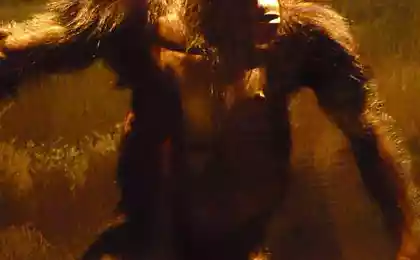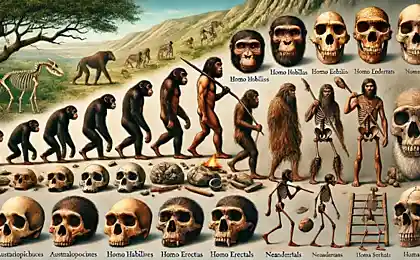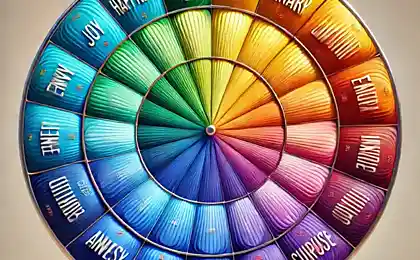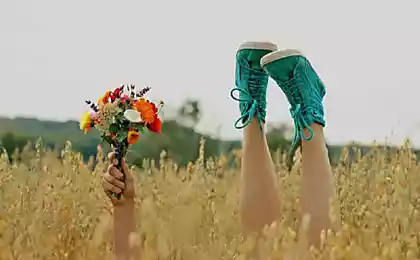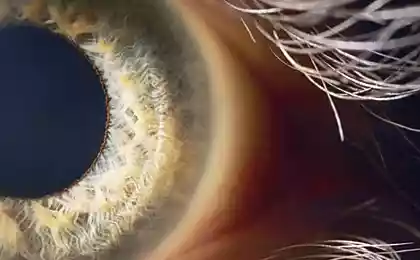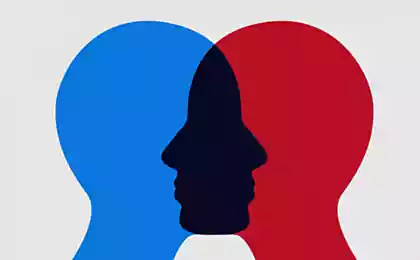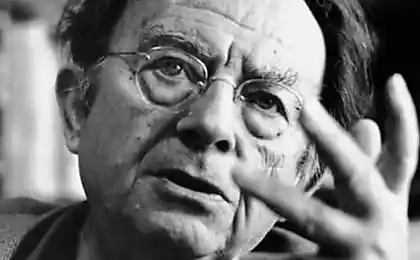593
Homo Sensitive: why do we believe that the human five senses?
The 5 senses that man possesses, is 5 methods of perception: hearing, sight, taste, smell and touch. For each of them we have a separate body or system. In the framework of his treatise On the soul 5 senses of a person singled out Aristotle, adding "common sense", which has no special bodily organ. With this notion the philosopher described the organizing role of the soul in sensory experience, which allow to evaluate not only the quality but also the essence of the things, despite the fact that the ear, for example, hears sounds but does not see color, etc.
From classical philosophy the concept of the 5 senses came to European medieval consciousness. The British Museum holds a silver brooch, fuller, made in the IX century and represent ways of perceiving. In the center there is Vision, considered the most important of all senses. Around it are the Taste, which keeps the hand in the mouth, sense of Smell, is depicted between two tall plants, Touch, are rubbing their hands, and the ears with your hand near your ear. And yet only since the XIII century the 5 senses began to depict and describe in Europe is quite clear. They are quite often mentioned in medieval Christian texts: commentaries on the Bible, sermons and other material for training — usually in the context of discussions about morals and vices.

Fuller brooch © wikipedia
Within the literature the presence of the person "5 outward senses", or "5 minds" (five wits), already recognized at the turn of XVI and XVII centuries. Are referred to, for example, in sonnet 141 by William Shakespeare (translated by A. Finkel):
No, not eyes, I love you Eyes, all your visible flaws.
Rejected vision Paluba,
Thee heart raves about incessantly.
Your voice has captured my ears,
And I don't want to hear invitations
At a voluptuous feast for your soul
No taste, no touch, no sight.
But all five senses and the mind at the same time
Can't save a heart from bondage.
My freedom is a shadow, and I've been
Dumb vassal of thy haughty will.
Only one thought comforted me:
You may be my sin, but you're my judge.
"5 senses was dedicated in the ancient Greek anatomists and physicians, so that this concept, in fact, has always been presented in a scientific framework, — says Sergey Vasilyev, head of the Department of physical anthropology, IEA RAS. — About the attempts of academia to change the existing list and add to it the other senses I know nothing." Nevertheless, today it is widely believed that the traditional list of the five senses should be added four more: thermoception (sense of heat and cold which provides the skin), equitization (sense of balance, determined by the working cavities with a fluid in the inner ear), nociception (perception of pain skin, joints and body organs) and proprioception (awareness of the body and where are its parts, which provide specific actions of the brain).
"The perception of heat, pain, body awareness and balance relate to the sense of touch and its organs, — says Vasilyev. — One of the five".
What would change if the person had 3 senses instead of 5?
In the human body decided to allocate the 5 senses: sight, hearing, taste, touch and smell. How much to change the picture of the world, if from the chain to remove the 2 feelings? What happens if you deprive the entire population of the world taste buds? What would happen to civilization if people were born blind? His vision of life on the planet in extreme conditions shared by the psychologist, therapist and art historian.
Irina Salykova, critic Man takes 80-90% of information through sight. Depriving a person of such importance on feelings, I think we would get a completely different picture of the world and, subsequently, the other history of mankind. In this regard, there would be no such thing as visual art. To replace him, perhaps, would come tactile or olfactory art.
If there is no vision, but there is an aesthetic need, the main role was played by the ear. Obviously, it would have been developed much more powerful than now. Humanity would have achieved much better results in the search for new ways of development are pleasant to the ear sounds, trying to utilize every available under the hand of the subject. The perception would be intensified with the smell. Here you can add and dance, but the dancers would not be: I would have danced all. How blind people feel the dance without touching human bodies to each other? Born to be art movements, a prerequisite of which was the involvement of all "spectators".
It is difficult to imagine what would happen if people lost two important senses: sight and hearing. Would these creatures do to people? Deaf, blind, dumb,... I think their only requirement Even without a vision would develop a painting, but not in the classic version of "a canvas-oil". For example, paint or alternative substances would have all the familiar scents that surround people in everyday life and carry a particular semantic charge. These paints would inflict on the canvas in a certain order, would combine with each other. And the person who appears in "looking" through the sense of smell has a clue what he wanted or what the artist painted. My mind immediately the idea of the still life. Perhaps in this case, the still life and landscape painting high standing in the hierarchy of artistic genres.
Tatiana Surdacki, the psychologist , the Information obtained by human brain from the senses, shapes the perception of the world around them and himself. What happens if we remove our sense of taste and smell? Let's take the common cold... Sometimes in the course of the disease, people no longer feel taste and smell. What is changing in this case? We experience discomfort. We are unusual, we have lost something that has always been by definition. Man eating soup or drinking tea, but feels nothing. He goes to the store and wants to buy a perfume, but does not feel absolutely no difference between toilet water. He even feels nothing.
Tatiana Surdacki, psychologist
If the smell would not be initially, that people would be able to adapt to it. When people lose some ability, they quickly find a replacement and compensate for it in another way. Blind people can begin to read using their tactile sensations, they read their own hands with the help of receptors on the skin of the fingers. People who can't talk, use their vision. People without hands will make the legs: to draw, to write, even can change the wheel of the Bicycle. What can be food? If people do not feel the taste and smell of food, to feel the difference between the courses they would be in other ways. The food could have been perceived as mixed, cold or hot, crispy, giving an interesting tactile feel.
The loss of smell, the emphasis would have shifted to the visual, tactile and auditory receptors. Perfumes and toilet water would not be at all, but even in this case, people pay attention to the beauty of the packaging, bottles, boxes, caps product. There would be something new that could use the remaining receptors
Maria Vorobyova, a therapist: If you offer to draw a person, what would it be? Probably, most of us will draw a creature with the head, hands and feet. On the head are the eyes, hands and feet — fingers. Such is the appearance of modern man. This is the norm, the standard. All human life is built for such people. And what happens when society appears not like? Blind, deaf? The answer is simple: they are taught special techniques to live and feel everything. Why? Just ordinary people, so familiar. The minority is obliged to live by the laws of the majority! And hardly anyone thought that the blind, deaf and unable to live in your dimension, in its own coordinate system.
"A CHILD BORN BLIND, UNAWARE OF THE FACT THAT HE IS BLIND UNTIL SOMEONE TELLS HIM ABOUT IT." STEPHEN KING
But if for a moment imagine that everything in the world changed? All become deaf or blind... will Change human society? It will be arranged with the new majority. Change the criteria of human evaluation: regular will be those who have missing or doesn't work any sensory analyzer, but seeing and hearing will be announced by people with disabilities. The change of relations in the system of "ordinary people — people with disabilities"? I think not. The presence or absence of vision or hearing does not affect the ability to "be human." published
P. S. And remember, just changing your mind — together we change the world! ©
Source: theoryandpractice.ru
From classical philosophy the concept of the 5 senses came to European medieval consciousness. The British Museum holds a silver brooch, fuller, made in the IX century and represent ways of perceiving. In the center there is Vision, considered the most important of all senses. Around it are the Taste, which keeps the hand in the mouth, sense of Smell, is depicted between two tall plants, Touch, are rubbing their hands, and the ears with your hand near your ear. And yet only since the XIII century the 5 senses began to depict and describe in Europe is quite clear. They are quite often mentioned in medieval Christian texts: commentaries on the Bible, sermons and other material for training — usually in the context of discussions about morals and vices.

Fuller brooch © wikipedia
Within the literature the presence of the person "5 outward senses", or "5 minds" (five wits), already recognized at the turn of XVI and XVII centuries. Are referred to, for example, in sonnet 141 by William Shakespeare (translated by A. Finkel):
No, not eyes, I love you Eyes, all your visible flaws.
Rejected vision Paluba,
Thee heart raves about incessantly.
Your voice has captured my ears,
And I don't want to hear invitations
At a voluptuous feast for your soul
No taste, no touch, no sight.
But all five senses and the mind at the same time
Can't save a heart from bondage.
My freedom is a shadow, and I've been
Dumb vassal of thy haughty will.
Only one thought comforted me:
You may be my sin, but you're my judge.
"5 senses was dedicated in the ancient Greek anatomists and physicians, so that this concept, in fact, has always been presented in a scientific framework, — says Sergey Vasilyev, head of the Department of physical anthropology, IEA RAS. — About the attempts of academia to change the existing list and add to it the other senses I know nothing." Nevertheless, today it is widely believed that the traditional list of the five senses should be added four more: thermoception (sense of heat and cold which provides the skin), equitization (sense of balance, determined by the working cavities with a fluid in the inner ear), nociception (perception of pain skin, joints and body organs) and proprioception (awareness of the body and where are its parts, which provide specific actions of the brain).
"The perception of heat, pain, body awareness and balance relate to the sense of touch and its organs, — says Vasilyev. — One of the five".
What would change if the person had 3 senses instead of 5?
In the human body decided to allocate the 5 senses: sight, hearing, taste, touch and smell. How much to change the picture of the world, if from the chain to remove the 2 feelings? What happens if you deprive the entire population of the world taste buds? What would happen to civilization if people were born blind? His vision of life on the planet in extreme conditions shared by the psychologist, therapist and art historian.
Irina Salykova, critic Man takes 80-90% of information through sight. Depriving a person of such importance on feelings, I think we would get a completely different picture of the world and, subsequently, the other history of mankind. In this regard, there would be no such thing as visual art. To replace him, perhaps, would come tactile or olfactory art.
If there is no vision, but there is an aesthetic need, the main role was played by the ear. Obviously, it would have been developed much more powerful than now. Humanity would have achieved much better results in the search for new ways of development are pleasant to the ear sounds, trying to utilize every available under the hand of the subject. The perception would be intensified with the smell. Here you can add and dance, but the dancers would not be: I would have danced all. How blind people feel the dance without touching human bodies to each other? Born to be art movements, a prerequisite of which was the involvement of all "spectators".
It is difficult to imagine what would happen if people lost two important senses: sight and hearing. Would these creatures do to people? Deaf, blind, dumb,... I think their only requirement Even without a vision would develop a painting, but not in the classic version of "a canvas-oil". For example, paint or alternative substances would have all the familiar scents that surround people in everyday life and carry a particular semantic charge. These paints would inflict on the canvas in a certain order, would combine with each other. And the person who appears in "looking" through the sense of smell has a clue what he wanted or what the artist painted. My mind immediately the idea of the still life. Perhaps in this case, the still life and landscape painting high standing in the hierarchy of artistic genres.
Tatiana Surdacki, the psychologist , the Information obtained by human brain from the senses, shapes the perception of the world around them and himself. What happens if we remove our sense of taste and smell? Let's take the common cold... Sometimes in the course of the disease, people no longer feel taste and smell. What is changing in this case? We experience discomfort. We are unusual, we have lost something that has always been by definition. Man eating soup or drinking tea, but feels nothing. He goes to the store and wants to buy a perfume, but does not feel absolutely no difference between toilet water. He even feels nothing.
Tatiana Surdacki, psychologist
If the smell would not be initially, that people would be able to adapt to it. When people lose some ability, they quickly find a replacement and compensate for it in another way. Blind people can begin to read using their tactile sensations, they read their own hands with the help of receptors on the skin of the fingers. People who can't talk, use their vision. People without hands will make the legs: to draw, to write, even can change the wheel of the Bicycle. What can be food? If people do not feel the taste and smell of food, to feel the difference between the courses they would be in other ways. The food could have been perceived as mixed, cold or hot, crispy, giving an interesting tactile feel.
The loss of smell, the emphasis would have shifted to the visual, tactile and auditory receptors. Perfumes and toilet water would not be at all, but even in this case, people pay attention to the beauty of the packaging, bottles, boxes, caps product. There would be something new that could use the remaining receptors
Maria Vorobyova, a therapist: If you offer to draw a person, what would it be? Probably, most of us will draw a creature with the head, hands and feet. On the head are the eyes, hands and feet — fingers. Such is the appearance of modern man. This is the norm, the standard. All human life is built for such people. And what happens when society appears not like? Blind, deaf? The answer is simple: they are taught special techniques to live and feel everything. Why? Just ordinary people, so familiar. The minority is obliged to live by the laws of the majority! And hardly anyone thought that the blind, deaf and unable to live in your dimension, in its own coordinate system.
"A CHILD BORN BLIND, UNAWARE OF THE FACT THAT HE IS BLIND UNTIL SOMEONE TELLS HIM ABOUT IT." STEPHEN KING
But if for a moment imagine that everything in the world changed? All become deaf or blind... will Change human society? It will be arranged with the new majority. Change the criteria of human evaluation: regular will be those who have missing or doesn't work any sensory analyzer, but seeing and hearing will be announced by people with disabilities. The change of relations in the system of "ordinary people — people with disabilities"? I think not. The presence or absence of vision or hearing does not affect the ability to "be human." published
P. S. And remember, just changing your mind — together we change the world! ©
Source: theoryandpractice.ru

